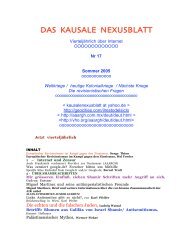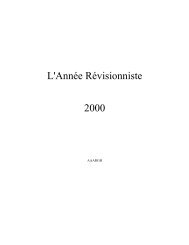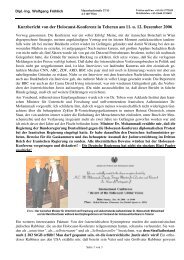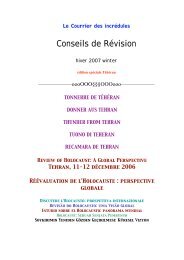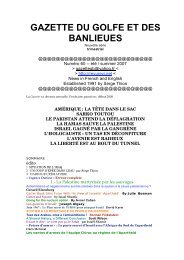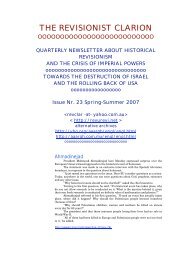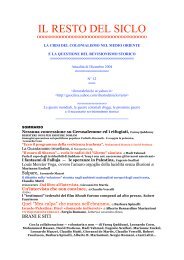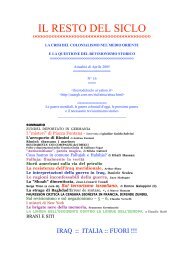You also want an ePaper? Increase the reach of your titles
YUMPU automatically turns print PDFs into web optimized ePapers that Google loves.
——————————————————————> Conseils de révisions / mai 2005<br />
from exercising independent judgment, Deborah Lipstadt, Professor of Jewish and Holocaust studies<br />
at Emory University, believed an author’s reputation alone could warrant the suppression of his or her<br />
work. Professor Lipstadt, whom Mr. Irving would eventually sue unsuccessfully for libel—as well as her<br />
British publisher, Penguin Books, Ltd.—told the Washington Post (April 3, 1996), “Of course the<br />
reputation of the author counts. And no legitimate historian takes David Irving’s works seriously.”<br />
According to Mr. Irving only six copies were in the United States and all were in the possession<br />
of St. Martin’s Press (e-mail to author, July 29, 2004). Hence an unexamined biography of Dr. Joseph<br />
Goebbels, a major historical figure of the twentieth century that contained the first utilization of<br />
Goebbels’s Moscow-archived diaries, was suppressed due to rage over the reputation of its author and<br />
not the content of the work. While the censoring of any book, even if content based, raises significant<br />
questions of free speech and the public’s legitimate access to information, banning the dissemination<br />
of a historical work, for reasons other than content, should prove troubling for historians as un-<br />
American and a threat to the enterprise of historical scholarship. Imagine if the next Howard Zinn<br />
book were not published due to influential-elite opposition that claimed his prior writings were<br />
seditious and a clear and present danger to the vital interests of the United States.<br />
Mr. Irving, however, was not without defenders on the implications of censoring history.<br />
Christopher Hitchens in Vanity Fair (June 1996) charged that St. Martin’s “disgraced the business of<br />
publishing and degraded the practice of debate. David Irving is not just a Fascist historian. He is also a<br />
great historian of Fascism.” Raul Hilberg, who wrote The Destruction of the European Jews, told Mr.<br />
Hitchens: “I have quoted [Adolph] Eichmann references that come from a neo-Nazi publishing house.<br />
I am not for taboos and I am not for repression.” E. J. Hobsbawm was interviewed by D. D.<br />
Guttenplan, the author of The Holocaust on Trial: History, Justice and the David Irving Libel Case .<br />
The illustrious Marxist historian noted that “most historians” have political viewpoints, and that Mr.<br />
Irving’s politics are irrelevant since historians should be judged “whether they produce work based on<br />
evidence.” (New York Times, June 26, 1999) Indeed many who oppose censorship have explored<br />
vigorously this dimension in assessing Mr. Irving’s scholarship.<br />
Another opponent of quashing Mr. Irving’s revisionist history of National Socialism is Gordon A.<br />
Craig , J. E. Wallace Sterling Professor Emeritus of Humanities at Stanford. In a dramatic book review<br />
of Goebbels in the New York Review of Books ( September 19, 1996) he wrote: “Silencing Mr. Irving<br />
would be a high price to pay for freedom from [his] annoyance...Mr. Irving, then, ha[s] an<br />
indispensable part in the historical enterprise and we dare not disregard [his] views.” Since the tumult<br />
over the publication of Goebbels, Mr. Irving has been largely confined to publishing his works,<br />
including Goebbels, under his own imprint, Focal Point Publications.<br />
I accepted a speaking invitation from a historian who has been castigated as anti-Semitic—a<br />
charge that Mr. Irving has consistently denied—and denounced for a falsified revisionism of Nazi<br />
Germany and the destruction of European Jewry. My mission, since my egregious suspension on<br />
Veterans Day, November 11, 2002, for an act of conscience through a harshly worded antiwar e-mail, is<br />
to demand academic freedom for university historians and no censorship of any historian for antiwar<br />
or historiographical incorrectness<br />
As an outspoken peace activist, pacifist and war resister, which were the underlying reasons for<br />
my suspension in the twelfth week of a semester, I commend Mr. Irving’s courageous and febrile<br />
opposition to the Anglo-American invasion of Iraq and the Israeli occupation of Palestine. I was not<br />
unmindful of this when I agreed to speak at his conference. If antiwar advocates can build coalitions<br />
across the ideological divide, then future degradations of the Palestinians, future Holocausts, future<br />
illegal walls of separation, future attacks on Jewish interests and future neoconservative crusades<br />
against nonthreatening Islamic nations may be averted. Of course, an acceptance of a speaking<br />
invitation does not connote uncritical acceptance of the host’s ethos. While disagreeing profoundly<br />
with Mr. Irving on the importance of racial diversity and the value of embracing ardently<br />
multiculturalism, I would neither stifle his speech nor banish his provocative and intrepid revisionism<br />
of World War II.<br />
I believe historians should welcome the opportunity to address any audience that is willing to<br />
listen and respond to their ideas. I stand in solidarity with all historians and other academics who have<br />
suffered for their views due to an intolerance of unpopular or infuriating speech. Any McCarthyite<br />
suppression of historiography or radical antiwar speech—no matter how offensive to<br />
some—must be challenged and condemned as anti-intellectual and antithetical to the<br />
advancement of knowledge in an open society.<br />
Without hectoring or condescending to an attentive and receptive audience of history buffs, I<br />
articulated my views on racism and war at Mr. Irving’s “Real History Conference.” In my remarks,<br />
“Historians v. American Militarism: Resisting Censorship,” I averred:<br />
- 17 -



